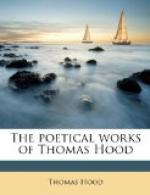V.
O, Martin I how thine eyes—
That one would think had put aside its
lashes,—
That
can’t bear gashes
Thro’ any horse’s side, must ache to spy
That horrid window fronting Fetter-lane,—
For there’s a nag the crows have pick’d
for victual,
Or some man painted in a bloody vein—
Gods! is there no Horse-spital!
That such raw shows must sicken the humane!
Sure Mr. Whittle
Loves thee but
little,
To let that poor horse linger in his pane!
VI.
O build a Brookes’s Theatre for
horses!
O wipe away the national reproach—
And find a decent Vulture for their corses!
And
in thy funeral track
Four sorry steeds shall follow in each coach!
Steeds that confess “the luxury
of wo!”
True mourning steeds, in no extempore black,
And
many a wretched hack
Shall sorrow for thee,—sore with kick and
blow
And bloody gash—it is the Indian knack—
(Save that the savage is his own tormentor)—
Banting shall weep too in his sable scarf—
The biped woe the quadruped shall enter,
And Man and Horse go half and half,
As if their griefs met in a common Centaur!
ODE TO THE GREAT UNKNOWN.[23]
“O breathe not his name!”—Moore.
[Footnote 23: After nearly eighty years it is almost pardonable to remind the reader that in the earlier days of the Waverley Novels their author was much talked of by the above title. The variety of Hood’s reading, and his resource in simile, are very noticeable in this Ode. The likening of Dominie Sampson to Lamb’s friend, George Dyer and the comparison of Mause Headrigg to Rae Wilson on his travels, are admirable examples.]
I.
Thou Great Unknown!
I do not mean Eternity, nor Death,
That vast incog!
For I suppose thou hast a living breath,
Howbeit we know not from whose lungs ’tis blown,
Thou man of fog!
Parent of many children—child of none!
Nobody’s
son!
Nobody’s daughter—but a parent still!
Still but an ostrich parent of a batch
Of orphan eggs,—left to the world to hatch
Superlative Nil!
A vox and nothing more,—yet not Vauxhall;
A head in papers, yet without a curl!
Not the Invisible
Girl!
No hand—but a handwriting on a wall—
A popular nonentity,
Still call’d the same,—without identity!
A lark, heard
out of sight,—
A nothing shin’d upon,—invisibly
bright,
“Dark with
excess of light!”
Constable’s literary John-a-nokes—
The real Scottish wizard—and not
which,
Nobody—in
a niche;
Every one’s
hoax!
Maybe Sir Walter
Scott—
Perhaps
not!
Why dost thou so conceal and puzzle curious folks?




